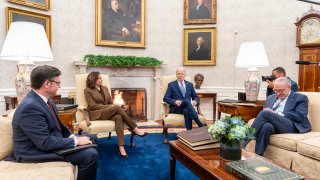
Bipartisan negotiators announced Wednesday they have struck a deal to avert a partial government shutdown this week, securing agreement on half of the dozen must-pass spending bills and extending a pair of fast-approaching funding deadlines deeper into March to buy Congress more time.
House Speaker Mike Johnson, R-La., and Senate Majority Leader Chuck Schumer, D-N.Y., said in a joint statement with appropriators, members charged with crafting spending bills, that they have a deal on six bills that fund several federal agencies, including the departments of Agriculture, Commerce, Energy, Interior, Justice, Transportation and Veterans Affairs. And they've agreed to vote on a short-term bill to avoid a partial government shutdown this weekend, buying more time to pass the funding deal.
“We are in agreement that Congress must work in a bipartisan manner to fund our government," the leaders said in the statement.
"After preparing final text, this package of six full year Appropriations bills will be voted on and enacted prior to March 8," Johnson, Schumer and the appropriators added. “The remaining six Appropriations bills — Defense, Financial Services and General Government, Homeland Security, Labor-HHS, Legislative Branch, and State and Foreign Operations — will be finalized, voted on, and enacted prior to March 22."
Get top local stories in San Diego delivered to you every morning. >Sign up for NBC San Diego's News Headlines newsletter.
The House returned to session Wednesday after a two-week recess, and Johnson promised to give members 72 hours before voting on a funding deal, leaving insufficient time to avoid a partial shutdown by the Friday midnight deadline without a stopgap bill.
“To give the House and Senate Appropriations Committees adequate time to execute on this deal in principle, including drafting, preparing report language, scoring and other technical matters, and to allow members 72 hours to review, a short-term continuing resolution to fund agencies through March 8 and the 22 will be necessary, and voted on by the House and Senate this week,” the party leaders said in the joint statement. The initial deadlines had been March 1 and March 8.
Still, the House and Senate need to pass the stopgap measure by the end of Friday in order to avert a partial shutdown. In the Senate, a speedy vote will require consent from all 100 members, which means it's not yet guaranteed they will pass it in time.
U.S. & World
Johnson said the House would vote Thursday on the short-term bill.
Earlier, on the Senate floor, Schumer said that averting a shutdown requires resisting the demands of the “extreme hard right, who want to burn everything down.”
The announcement came a day after President Joe Biden hosted the top four congressional leaders at the White House to try to hammer out separate deals on funding the government and sending aid to Ukraine and other foreign allies.
Without the two stopgap measures, part of the federal government would shut down early Saturday, and the rest would shutter a week later. Johnson had proposed moving the two deadlines to March 8 and March 22, two sources familiar with the negotiations said.
“Any CR would be part of a larger agreement to finish a number of appropriations bills, ensuring adequate time for drafting text and for members to review prior to casting votes,” said Athina Lawson, a spokesperson for the speaker.
There is broad agreement among the congressional leaders that a shutdown would be a fruitless exercise.
"We are so proud that we have their Band-Aid budgets that take us from week to week and month to month. We are so proud that we keep the lights on in Washington," Senate Majority Whip Dick Durbin, D-Ill., said in jest. "We should be dealing with issues that are meaningful to Americans immediately," like solving the border crisis and protecting in vitro fertilization, or IVF, he added.
As House Republicans hold out for more, Congress is still operating on the 2022 budget Schumer and Biden passed with then-Speaker Nancy Pelosi, D-Calif., during the Democratic trifecta. Lawmakers have punted on new funding bills three times this Congress and now face a fourth.
This story first appeared on NBCNews.com. More from NBC News:



